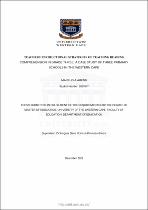Teachers’ instructional strategies of teaching reading comprehension in grade three: a case study of three primary schools in the Western Cape
Abstract
This study investigates the instructional strategies employed in teaching reading
comprehension in Grade Three. The aim is to address gaps in knowledge by identifying
teachers’ reading comprehension strategies. A deeper understanding of these strategies
contributes to literacy development and enhances our understanding of reading and associated
policies.
This study is grounded in the principles of Piaget’s cognitive constructivism and Vygotsky’s
social constructivism. It demonstrates how diverse reading instructional strategies mediate the
process of reading, aiming to improve reading skills and foster comprehension. Using a
qualitative approach and a multiple case study design, nine participants were purposefully
selected from three primary schools in the Western Cape. Data were gathered through
document analysis, observations, and semi-structured interviews, with thematic analysis
employed for data analysis.
Participants’ reading instruction aligns with the goals and aims of the Grade Three Curriculum
and Assessment Policy. However, the study findings do not necessarily correlate with
improved literacy outcomes. The participants predominately relied on the questioning strategy,
with research-based reading strategies not consistently recognized or utilised.

